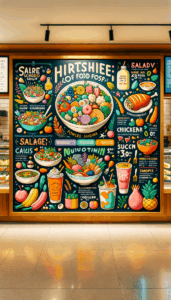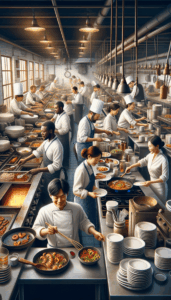Adapting to Change: Restaurant Strategies for Success
- Phone: +1(833)PHX-Geek
- 712 H St NE Suite 1904 Washington, D.C. 20002
Take a look at our camera system. Get remote access to your cameras, and monitor your restaurant while you are away. Great protection for you from theft, employee grift and wrongful lawsuits.
Introduction
In an ever-evolving culinary landscape, restaurant operators are constantly adapting to meet the changing expectations of their guests. Whether your establishment is counter-service, fast-casual, full-service casual, or fine-dining, understanding these dynamics is crucial for sustaining a successful business. This article explores the essential strategies that operators can adopt to run healthier, more durable restaurants while satisfying their clientele's desires.
As the dining landscape evolves, guests’ expectations are shifting dramatically. Consumers today seek not only high-quality meals but also unique dining experiences that resonate with their values. This includes a growing preference for transparency in sourcing ingredients, sustainability practices, and accommodating dietary restrictions. Restaurant operators must stay attuned to these trends and adapt their offerings to meet the diverse needs of their clientele. 
Moreover, the rise of technology in the dining experience, such as online reservations and contactless payments, has set a standard for convenience that customers now expect. Restaurants that fail to integrate these elements may fall behind. Understanding these expectations is not merely a matter of staying relevant; it's about creating connections with guests that foster loyalty and repeat business.
Finally, engaging with customers through social media and soliciting feedback can provide valuable insights into their preferences. By prioritizing guest expectations, restaurants can enhance the overall dining experience and position themselves as leaders in a competitive market.
In recent years, health consciousness among diners has surged, prompting more restaurants to consider healthier menu options. Offering dishes that emphasize fresh, local, and organic ingredients not only caters to health-conscious consumers but also supports sustainability efforts. This approach fosters a positive brand image and attracts a broader customer base.
Incorporating plant-based options, reducing processed ingredients, and highlighting nutritional information can significantly enhance a restaurant's appeal. As guests become more aware of the impact of their food choices on health and the environment, restaurants that prioritize these factors will likely see increased patronage.
Additionally, promoting menu items that are both nutritious and delicious can lead to higher customer satisfaction. By emphasizing healthful choices, restaurants can establish themselves as responsible and caring establishments, ultimately leading to long-term success.
 Operational durability is key to a restaurant's long-term success, especially in today's competitive market. Streamlining operations through effective kitchen management, staff training, and inventory control can result in significant cost savings and improved service quality. Operators are encouraged to invest in training programs that not only improve staff efficiency but also enhance the overall dining experience.
Operational durability is key to a restaurant's long-term success, especially in today's competitive market. Streamlining operations through effective kitchen management, staff training, and inventory control can result in significant cost savings and improved service quality. Operators are encouraged to invest in training programs that not only improve staff efficiency but also enhance the overall dining experience.
Embracing technology, such as restaurant management software, can also boost efficiency. This enables operators to manage reservations, orders, and inventory seamlessly, allowing them to focus on providing exceptional service. Furthermore, analyzing data from these systems can offer insights into customer preferences and operational bottlenecks, facilitating informed decision-making.
Lastly, creating a positive work environment is essential for employee retention and satisfaction. Happy employees are more productive and provide better service, contributing to a durable business model that withstands challenges in the industry.
The restaurant industry is in a state of flux, with emerging trends shaping the future of dining. One significant trend is the integration of technology, including artificial intelligence and automation, which is revolutionizing service delivery. Restaurants are leveraging technology not only to streamline operations but also to enhance customer engagement through personalized experiences.
Sustainability continues to be a prominent focus, with establishments adopting eco-friendly practices and sourcing local ingredients to minimize their environmental impact. This trend aligns with consumer preferences for responsible dining, making it a crucial aspect of future restaurant operations.
Furthermore, the rise of delivery and takeout services, accelerated by the pandemic, is likely to remain a staple of the dining experience. Restaurants that adapt their business models to accommodate these preferences will be better positioned for success in the evolving culinary landscape.
Conclusion
In conclusion, whether counter-service, fast-casual, full-service casual, or fine-dining, restaurants must navigate the changing expectations of their guests while embracing healthier, more sustainable business practices. By understanding customer desires, offering nutritious options, optimizing operations, and staying ahead of culinary trends, restaurant operators can successfully build durable businesses that thrive in an ever-competitive marketplace.